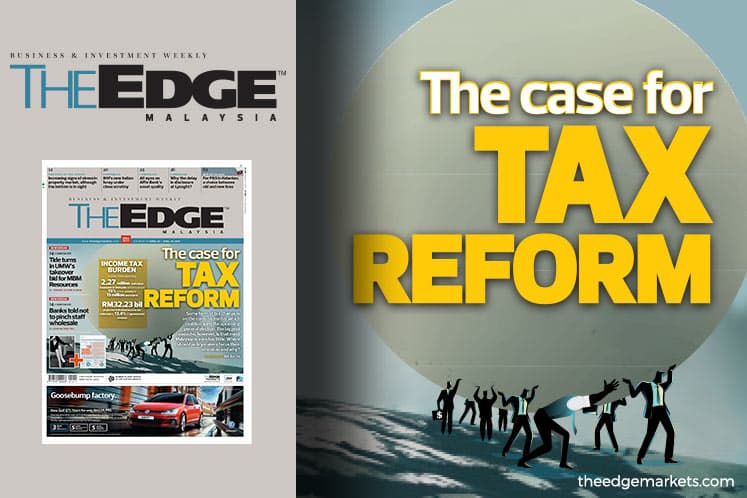
KUALA LUMPUR (April 21): The Edge weekly in its latest edition discusses the case for tax reform in Malaysia.
In its cover story, the Edge’s Cindy Yeap wrote that changes to the country’s tax regime are on the cards, whoever wins the upcoming 14th general election (GE14).
The weekly said that in its GE14 manifesto, the ruling Barisan Nasional coalition mentions a revision of individual and corporate income taxes to ensure Malaysia remains competitive regionally while the opposition Pakatan Harapan wants a holistic review of the national tax system.
The magazine highlighted that both sides speak of putting more money into the hands of the people, who should live better as Malaysia progresses towards high-income developed nation status.
Yet the biggest headache for policymakers is that most Malaysians earn too little wages, it said.
The Edge explained that half of Malaysians earn less than RM1,703 a month, according to 2016 data from the Department of Statistics — barely enough to live from day to day, let alone squirrel away enough money for retirement.
Even among degree holders, half earn less than RM4,810 a month — the equivalent of US$1,235 or S$1,623 (not enough to be a taxpayer in Singapore where the median income is S$4,232 a month), it said.
In Malaysia, however, a monthly income of RM4,810 is considered to be “on the high side”.
The Edge said that if you earn RM4,810, you will be among the 2.27 million people or 15% of the labour force paying individual income tax.
It added that even some of their retirement savings with the Employees Provident Fund is taxed.
“The labour income share to gross domestic product (GDP) is still quite low at about 35%, which also proves wages are low in Malaysia even though labour is an important factor to production,” the Edge quoted executive director of Malaysian Institute of Economic Research, Dr Zakariah Abdul Rashid as saying.
Meanwhile, the Economic Planning Unit wants 40% labour share to GDP by 2020 but meeting that deadline would be tough with only two years left.
“The 40% is already seen in other developed countries,” laments Zakariah, weighing in on the importance of achieving the target in the coming years.
He also points out that the minimum salary for the over 1.6 million government servants, at RM1,200 a month, is already higher than the minimum wage for the private sector of RM1,000 in Peninsular Malaysia and RM920 in Sabah and Sarawak. Unlike civil servants, most private wage earners do not have a pension.
“Malaysians generally earn too little to have a minimum acceptable standard of living as income is barely sufficient to cover the rising cost of living,” says Lee Heng Guie, executive director of Socio-Economic Research Centre (SERC).
For a detailed understanding of the tax reforms that could be on the cards in the country, read The Edge for the week of April 23 – April 29 available at newsstands now.
Save by subscribing to us for your print and/or digital copy.
P/S: The Edge is also available on Apple's AppStore and Androids' Google Play.